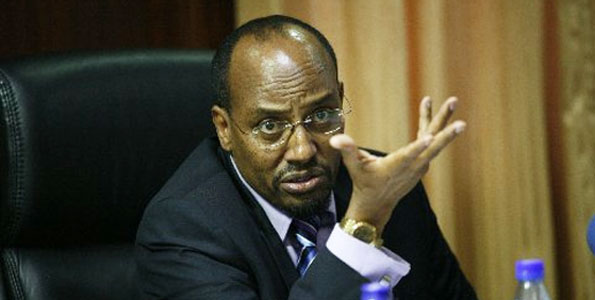Addis Ababa (HAN) July 9, 2015 – Public Diplomacy and Regional Security Initiative News – Kenya has a security problem, Could Kenya Learn From Ethiopia’s Anti-terror Strategy? Review of Gabe Joselow (VOA), republished by HAN. Fighters from the militant group al-Shabaab, driven from their strongholds across Somalia, have claimed responsibility for gruesome attacks targeting non-Muslims in northeastern Kenya: hijacking a bus full of passengers in one recent incident, and attacking quarry workers as they slept in their tents in another.
Billow Kerrow is a senator from Mandera County in Kenya on the border with Somalia, the country where both attacks took place.
“So we have a situation where most of the al-Shabaab forces seem to be largely in control of the area bordering Mandera – this Gedo region – so we have a situation where we have large numbers of people there and we don’t have a border that is really properly secured.”
Success Security story in Ethiopia:
The chairman of the electoral board, Merga Bekana, said this year’s elections were conducted in a “free, fair, peaceful, credible and democratic manner.”
Bereket Simon, Ethiopia’s minister of communication affairs, said last month that the EPRDF government did not need coercion to win the Ethiopian election because “the people of Ethiopia know for sure the future of Ethiopia lies with this government.” “Anyone who opposes the ruling party is an enemy of the Ethiopian people.”
The government will stay its course for the next five years, said Getachew Reda, an adviser to the prime minister who recently won a seat in Parliament.
“No sea change in terms of policy,” he said, “just a fine-tuning on the basis of what has transpired over the last five years.” The Ethiopian Prime Minister Hailemariam Desalegn will retain his post until 2020.
Meanwhile, Billow Kerrow has noticed that Kenya’s neighbor to the north, Ethiopia, has had much more success preventing terrorism on its own soil, despite having a much longer border with Somalia, and a longer history of military involvement in the country. And he thinks Kenya should look to Ethiopia as a model.
“What I know is on most of its border they have created a buffer, almost 50 to 100 kilometers, and any activity by these groups in that region will be met by an incursion directly that will immediately eliminate the threat,” Kerrow said.
There have been some terrorist incidents in Ethiopia, but not nearly on the same scale as Kenya.
In 2013 a bomb exploded in the capital, Addis Ababa, allegedly killing two militant operatives.
The U.S. Embassy warned in October of this year of another al-Shabab threat in the Ethiopian capital, though nothing apparently came of it.
Cedric Barnes, Horn of Africa Project Director at the International Crisis Group, attributes much of Ethiopia’s anti-terror success to its work developing a police force from local communities in the ethnically Somali east.
“Over the last few years, you’ve seen Ethiopia devolve a lot of security to a locally recruited police force called Liyu police, who are basically local Somalis who are police, but they are also counter-insurgency,” Barnes said.
But he notes that Ethiopia’s system is not necessarily translatable to Kenya. For one thing, Ethiopia has been security-minded for years, he says, and has “radically devolved” power to local authorities – a process Kenya is just beginning to implement.
Barnes says imposing an Ethiopian-style security mechanism in Kenya could mean rolling back some of the political liberalization that has taken place, particularly in the Somali-dominated northeast.
“There are so many gains that have been made, it would be a real pity to reverse some of those in the interest of a security threat which could be dealt with fairly easily by better intelligence, a more devolved police force especially,” Barnes said.
The Ethiopian government has repeatedly denied using anti-terror laws for anything other than the security of the country.
Kenya too is considering revamping its laws to give police more power to detain terror suspects, which, like Ethiopia’s law, is likely to raise questions about whether the country is trading rights for security.
Photo: Jubilee Senator Billow Kerrow accuses President Uhuru’s media
HAN & Geeska Afrika Online (1985-2015), the oldest free independent Free Press in the region, brings together top journalists from across the Horn of Africa. Including Ethiopia, Somalia, Eritrea, Sudan, Djibouti, South Sudan, Uganda, Kenya, Oromo, Amhara, Somali, Afar and Harari. Plus, we have daily translations from 150 major news organizations in the Middle East and East African regions. Contact at news@geeskaafrika.com

Leave a Reply